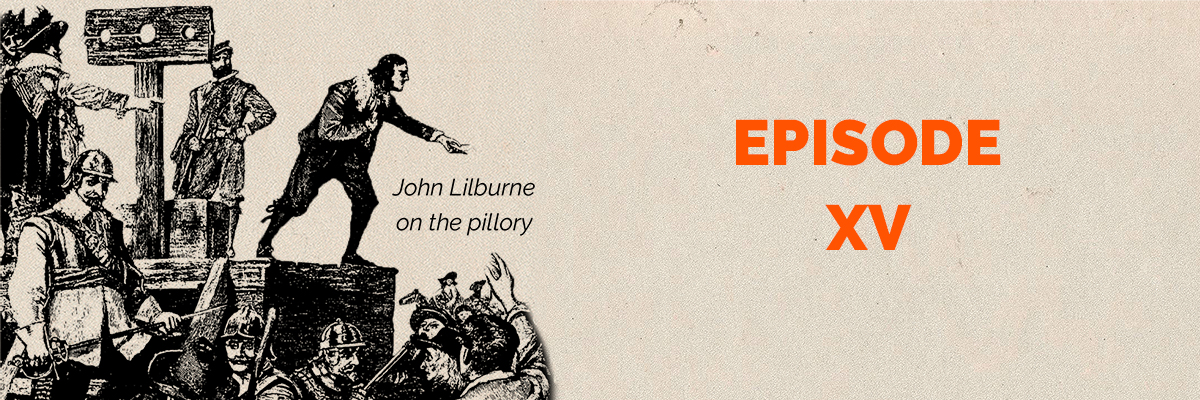Episode 15 returns to Europe and formative events in 17th Century England, where a mostly forgotten group of radicals demanded a written constitution guaranteeing free speech, liberty of conscience, and democracy. But who were the Levellers? What was the historical context of their radical demands and why were they ultimately crushed by former allies?
Listen and find the answers to such questions as:
- Who was the first English author to demand full religious toleration for both heretics and non-Christians?
- Why did Charles I and Archbishop Laud cut off the ears of dissenting Puritans?
- What happens when you try to impose alien religious ceremonies on proud and devout Scots?
- Why was censorship abolished in 1641 and what were the consequences?
- What happened at the Putney Debates?
- How radical were the Levellers’ demands for free speech and liberty of conscience?
- Did John Milton really become a censor himself?
- Why did traditionalists refer to pamphlets and books as “paper-bullets?”
You can subscribe and listen to Clear and Present Danger on Apple Podcasts, Google Play, YouTube, TuneIn, and Stitcher, or download episodes directly from SoundCloud.
Stay up to date with Clear and Present Danger on the show’s Facebook and Twitter pages.
Email us feedback at freespeechhistory@gmail.com.
Literature: Episode 15
- Clegg, C.S. (2008): Press Censorship in Caroline England. Cambridge University Press.
- Curtis, M.K. (1991): “In Pursuit of Liberty: The Levellers and the American Bill of Rights” in: Constitutional Commentary, Wake Forest Univversity Legal Studies Paper 956931, p. 801.
- Curtis, M.K. (2000): The People’s Darling Privilege: Struggles for Freedom of Expression in American History (Constitutional Conflicts). Duke University Press Books.
- Davis, J.C. (1992): “Religion and the Struggle for Freedom in the English Revolution” in: The Historical Journal 35(3). pp. 507–530.
- Early, T.E. (2009): The Life and Writings of Thomas Helwys (Early English Baptist Texts). Mercer University Press.
- Foxley, R. (2013): The Levellers: Radical Political Thought in the English Revolution. Manchester University Press.
- Hargreaves, R. (2003): The First Freedom: A History of Free Speech. Sutton Publishing.
- Hill, C. (1984): The World Turned Upside Down: Radical Ideas During the English Revolution. Penguin Books.
- Kishlansky, M.A. (1979): “The Army and the Levellers: The Roads to Putney” in: The Historical Journal 22(4). Pp. 795–824.
- Levy, L.W. (1985): Emergence of a Free Press. Oxford University Press.
- Levy, L.W. (1995): Blasphemy: Verbal Offences Against the Sacred, From Moses to Salman Rushdie. The University of North Carolina Press.
- Levy, L.W. (1999): “Freedom of Speech in Seventeenth-Century Thought” in: The Antioch Review 57(2). Pp. 165–177.
- Raymond, J. (2006): Pamphlets and Pamphleteering in Early Modern Britain (Cambridge Studies in Early Modern British History). Cambridge University Press.
- Peacey, J. (2000): ”John Lilburne and the Long Parliament” in: The Historical Journal 43(3). pp. 625–645.
- Robertson, R. (2009): Censorship and Conflict in Seventeenth-Century England – The Subtle Art of Division. Penn State University Press.
- Taylor, D. (2011): l’Estrange His Life: Public and Persona in the Life and Career of Sir Roger l’Estrange, 1616–1704. (Doctoral dissertation). University of Kansas.
- Woodford, B. (2014): “Developments and Debates in English Censorship During the Interregnum” in: Early Modern Literary Studies 17(2).
Online literature
- BBC – Al-Qaeda material bride Ruksana Begum jailed – 6.12.12: https://www.bbc.com/news/uk-england-london-20629275
- BCW Project – British Civil Wars, Commonwealth & Projectorate 1638–1660: “England’s Lamentable Slaverie.” Accessible at: http://bcw-project.org/texts/englands-lamentable-slaverie.
- BCW Project – British Civil Wars, Commonwealth & Projectorate 1638–1660: ”William Walwyn, c. 1600–81”. Accessible at: http://bcw-project.org/biography/william-walwyn.
- British History Online: ”June 1643: An Ordinance for the Regulating of Printing”. Accessible at: https://www.british-history.ac.uk/no-series/acts-ordinances-interregnum/pp184-186.
- British History Online: “May 1648: An Ordinance for the punishing of Blasphemies and Heresies, with the several penalties therein expressed.” Accessible at: https://www.british-history.ac.uk/no-series/acts-ordinances-interregnum/pp1133-1136.
- BuzzFeed – The UK Government Is Planning To Set Up A Regulator For The Internet – 20.09.2018 – https://www.buzzfeed.com/alexwickham/uk-government-regulator-internet
- Evening Standard – South Yorkshire Police relentlessly mocked after urging people to report one another for ‘offensive or insulting words’ – 10.09.2018: https://www.standard.co.uk/news/crime/south-yorkshire-police-relentlessly-mocked-after-urging-people-to-report-one-another-for-offensive-a3932131.html
- Jeremy Norman’s History of Information. ”A Decree of the Star Chamber Concerning Printing July 11, 1637”. Accessible at: http://www.historyofinformation.com/expanded.php?id=3899.
- National Library of Scotland. ”The Stoneyfield Sabbath Day”. Accessible at: https://www.digital.nls.uk/scotlandspages/timeline/1637.html.
- Online Library of Liberty: “The English Revolution”. Accessible at: http://oll.libertyfund.org/groups/68.
- ”James I and the Divine Right of Kings” & ”Charles I rules without Parliament”. Accessible at: http://www.saburchill.com/history/chapters/chap4002.html.
- Parliament.uk – Make tech companies liable for use of “harmful and misleading material” on their sites – 29.07.2018: https://www.parliament.uk/business/committees/committees-a-z/commons-select/digital-culture-media-and-sport-committee/news/fake-news-report-published/
- Randy Robertson’s British Index 1641 – 1700 https://www.academia.edu/372922/Prefatory_Note_to_The_British_Index_1641-1700
- The Times – Police arresting nine people a day in fight against web trolls – 12.10.207 – https://www.thetimes.co.uk/article/police-arresting-nine-people-a-day-in-fight-against-web-trolls-b8nkpgp2d
Great podcasts covering the subject of this episode
- BBC 4: In Our Time. Episode: “The Putney Debates”. Accessible at: https://www.bbc.co.uk/programmes/b01rw1k7.
- Mike Duncan: Revolutions. Episodes 1.1–1.16. Accessible at: http://www.revolutionspodcast.com/.
